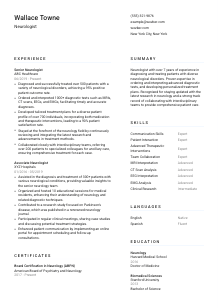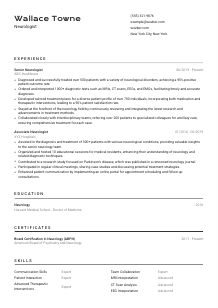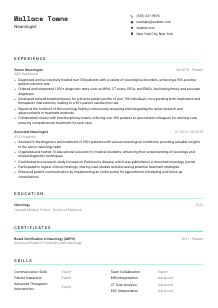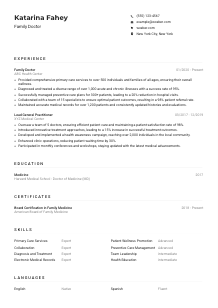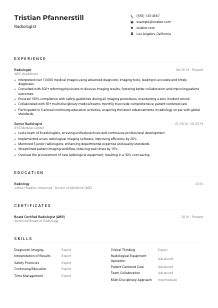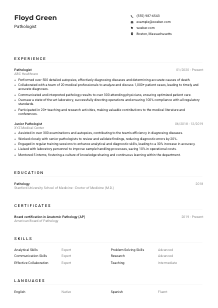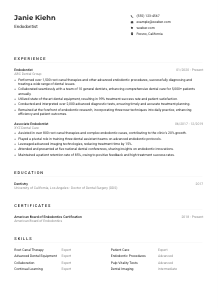Neurologist CV Example
Delving into the brain's mysteries, but your CV feels like a headscratcher? Tune into this Neurologist CV example, engineered with Wozber free CV builder. Learn how to map your neurological prowess to match job expectations, making your career as clear and focused as a healthy mind!
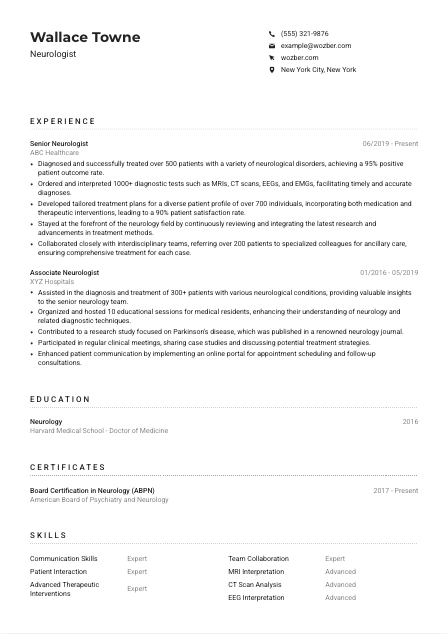
How to write a Neurologist CV?
Embarking on your journey as a Neurologist requires not only a deep knowledge of the nervous system but also an ability to present your expertise effectively on your CV. In the competitive landscape of Neurology positions, how you tailor your CV can make the difference between getting noticed or being overlooked. With the aid of Wozber's free CV builder and its dedicated tools for ATS optimisation, let's navigate the intricacies of customizing a CV that not only speaks volumes about your qualifications but also passes through Applicant Tracking Systems (ATS) with ease.
Ready to synchronize your professional achievements with your career aspirations? Let's dive in!
Personal Details
The 'Personal Details' section is your CV's opening remarks. It sets the tone, inviting the hiring manager into your professional life. For a Neurologist, this means crafting a profile that reflects precision, care, and readiness to serve patients with neurological disorders. Let's decode how to master this on your CV.
1. Present Your Name Professionally
Your name is the cornerstone of your personal brand. Use a clear, professional font and preferably, position your name at the top, distinguishing it from other sections with a slightly larger font size for immediate impact.
2. Match Your Title with The Role
Right beneath your name, align your professional title with the role you're applying for. 'Neurologist' should be prominently featured, creating an immediate connection with the job description and emphasizing your expertise.
3. Ensure Contact Information Is Accurate
Provide your most reliable contact number and a professional email address that includes your name. Remember, attention to detail is fundamental in Neurology - this extends to ensuring your contact details are error-free.
4. Showcase Your Location
"New York City, New York" resonates with the job requirements. Including your city and state confirms your readiness for the position, especially in roles where proximity and availability are crucial.
5. Add a Professional Profile URL
Include a link to your LinkedIn profile or personal website showcasing your professional achievements, publications, or any other relevant professional online presence. This demonstrates the breadth of your commitment to your field.
Takeaway
Perfecting the 'Personal Details' section is about making a compelling first impression. It's a testament to your professionalism and an invitation to explore your qualifications further. Remember, this is just the beginning of your narrative.





Experience
The 'Experience' section is the backbone of your CV, a detailed account of your journey through the field of Neurology. It's where you showcase not just where you've been, but how you've made an impact. Here's how to articulate your neurology-specific experience to resonate with the job and the ATS.
- Diagnosed and successfully treated over 500 patients with a variety of neurological disorders, achieving a 95% positive patient outcome rate.
- Ordered and interpreted 1000+ diagnostic tests such as MRIs, CT scans, EEGs, and EMGs, facilitating timely and accurate diagnoses.
- Developed tailored treatment plans for a diverse patient profile of over 700 individuals, incorporating both medication and therapeutic interventions, leading to a 90% patient satisfaction rate.
- Stayed at the forefront of the neurology field by continuously reviewing and integrating the latest research and advancements in treatment methods.
- Collaborated closely with interdisciplinary teams, referring over 200 patients to specialized colleagues for ancillary care, ensuring comprehensive treatment for each case.
- Assisted in the diagnosis and treatment of 300+ patients with various neurological conditions, providing valuable insights to the senior neurology team.
- Organized and hosted 10 educational sessions for medical residents, enhancing their understanding of neurology and related diagnostic techniques.
- Contributed to a research study focused on Parkinson's disease, which was published in a renowned neurology journal.
- Participated in regular clinical meetings, sharing case studies and discussing potential treatment strategies.
- Enhanced patient communication by implementing an online portal for appointment scheduling and follow‑up consultations.
1. Align Experiences With Job Requirements
Scrutinize the job requirements and mirror them with your professional achievements. For instance, "Diagnosed and successfully treated over 500 patients with a variety of neurological disorders" directly addresses the core duty of diagnosing and treating neurological patients.
2. Organize Chronologically
Showcase your career progression by listing your experiences from the most recent to the oldest. This helps hiring managers quickly assess your current capabilities and envision your growth trajectory within their organisation.
3. Highlight Achievements with Metrics
Quantify your accomplishments wherever possible. Numbers like "successfully treated over 500 patients" or "ordered and interpreted 1000+ diagnostic tests" provide tangible evidence of your expertise and dedication.
4. Prioritize Relevance
Ensure every point emphasizes your suitability for the Neurologist role. Extracurricular achievements are commendable but focus on neurology-specific experiences that demonstrate your capability and passion for this field.
5. Use Action-Oriented Language
Employ vigorous and precise language to describe your roles and achievements. Words like 'diagnosed,' 'developed,' and 'collaborated' are powerful and demonstrate your proactive approach in your practice.
Takeaway
Constructing a narrative of your professional journey with care and precision reflects your dedication as a Neurologist. Let your experience speak to your competence, compassion, and commitment to advancing in your field.
Education
Your educational foundation in Neurology is a testament to your knowledge and commitment to this demanding field. From your initial medical degree to specialized neurology training, each step in your educational journey has prepared you for the challenges and responsibilities of a Neurologist. Here's how to highlight your educational background effectively.
1. Identify Essential Qualifications
The position requires a "Doctor of Medicine (MD) or Doctor of Osteopathic Medicine (DO) degree from an accredited medical school." Make sure these qualifications are prominent, reflecting the key educational requirements for the role.
2. Structure Clearly
List your most relevant degrees in an easy-to-follow format, placing the highest degree of relevance (e.g., MD in Neurology) at the top. The clarity of this section can reflect your ability to organize and present complex information - a crucial skill for a Neurologist.
3. Match Degree Details
If your degrees directly align with the role's requirements, ensure they are presented accurately. For example, your "Doctor of Medicine" degree should be followed by your specialization in Neurology to immediately signal your fit for the position.
4. Consider Relevancy of Courses and Achievements
While listing every course and achievement isn't necessary, emphasizing ones that showcase your proficiency in specialized areas of Neurology can be incredibly beneficial, especially if they directly relate to the job description.
5. Highlight Additional Educational Milestones
Did you contribute to Neurology research? Publish papers? Engage in notable projects? These accomplishments underscore your dedication and active participation in the advancement of your field.
Takeaway
Your education is more than a list of degrees; it's the bedrock of your expertise in Neurology. Portray it in a way that highlights your dedication, specialization, and readiness to contribute to the field.
Certificates
In the evolving field of Neurology, continual learning is key. Certifications not only augment your expertise but also demonstrate your commitment to staying at the forefront of medical advances. Here's how to position your certificates to shine.
1. Match Key Certifications
"Board Certification in Neurology (ABPN)" and "Medical License" are non-negotiable requirements for the role. These certificates should be prominently displayed, affirming your qualifications and dedication to the field.
2. Prioritize Connection to Role
List certifications that are most relevant to being a Neurologist. This targeted approach assures the hiring manager of your specialized knowledge and skills, directly applicable to the challenges of the position.
3. Display Dates Clearly
For certifications with validity periods, like your ABPN Board Certification, the display of issuance and expiration dates (if any) confirms your current standing and dedication to maintaining your credentials.
4. Embrace Ongoing Education
Neurology is a rapidly advancing field. Highlighting recent or advanced certifications portrays you as a professional committed to growth, eager to incorporate the latest techniques and research into your practice.
Takeaway
Your certifications are badges of your expertise and dedication. Showcase them as evidence of your commitment to excellence in Neuromedicine. Remember, each certificate is a stepping stone towards your goal of becoming an exceptional Neurologist.
Skills
The 'Skills' section of your CV is where you distill your professional capabilities into a potent list of core competencies. For a Neurologist, this includes a blend of technical proficiencies and the soft skills that enable effective patient care and collaboration. Let's build this section with precision.
1. Extract From Job Description
Identify both explicit and implicit skills demanded by the job. Skills like "Strong interpersonal and communication skills, with a high level of empathy and patience" are clear markers of what the job requires.
2. Align Your Skills
For each skill mentioned in the job description, reflect on your own experiences. Include both hard skills like "MRI interpretation" and soft skills such as "patient interaction." Prioritize those that are strongly aligned with the role's requirements.
3. Organize and Prioritize
Keep your skills section concise by focusing on skills most relevant to a Neurologist. Your expertise in "Advanced Therapeutic Interventions" or "Clinical Research" showcases not just your knowledge but also your capability to apply it effectively.
Takeaway
Think of the 'Skills' section as a concise showcase of your neurological toolkit. Each skill you list should resonate with the qualifications the job seeks, making it clear why you're not just a fit, but the ideal candidate for the role.
Languages
In the global environment of healthcare, the ability to communicate in multiple languages can significantly enhance your effectiveness as a Neurologist. Whether it's for patient care or collaborative research, showcasing your linguistic abilities can set you apart.
1. Verify Job Language Requirements
In our example, proficiency in the English language is a necessity. Ensure that this requirement is clearly met in your CV, positioning your ability to engage effectively in the professional setting.
2. Feature Essential Languages
List the languages required by the job first, specifying your level of proficiency. For example, if you're a native English speaker, state it clearly to align with the job requirement.
3. Showcase Additional Languages
Even if not explicitly required, additional languages you're fluent in, such as Spanish, could provide an edge, demonstrating your ability to communicate with a broader patient base or international colleagues.
4. Be Honest About Proficiency
Clearly delineate your proficiency in each language with terms such as 'Native,' 'Fluent,' 'Intermediate,' or 'Basic.' This clarity helps to set realistic expectations about your communicative capabilities.
5. Consider the Role's Scope
For positions with a potential for international collaboration or diverse patient demographics, your multilingual skills may play a critical role, enhancing your CV's appeal and demonstrating your versatility.
Takeaway
Your linguistic skills are bridges to understanding, enabling deeper connections with patients and colleagues alike. Highlight these abilities as integral components of your professional identity, showcasing your readiness to excel in a global healthcare environment.
Summary
Your CV's summary is a compelling teaser of your professional narrative. As a Neurologist, this section is your opportunity to encapsulate your expertise, passions, and the unique value you bring to a prospective employer. Let's craft it to grasp attention.
1. Distill the Job Essence
Begin by internalizing the job description. Understand the core responsibilities and qualifications required, then reflect on how your career journey aligns with these needs.
2. Start with a Strong Opening
Lead with a statement that positions you as a dedicated and skilled Neurologist. Mention your years of experience and your main areas of expertise to immediately demonstrate your suitability for the position.
3. Highlight Matching Skills and Achievements
Share a few select achievements that directly address the job's key requirements. Emphasize experiences like "diagnosing and treating patients with diverse neurological disorders" and "collaborating with interdisciplinary teams" to showcase your capability and versatility.
4. Keep It Concise and Impactful
Your summary should be a crisp and engaging invitation to read further, not an exhaustive account. Aim for 3-5 punchy lines that encapsulate who you are as a Neurologist and what you can bring to the table.
Takeaway
The summary is the gateway to your professional story, framing your CV with clarity and intrigue. Use it to make a compelling case for why you're not just a candidate, but the Neurologist the hiring team has been searching for.
Launching Your Neurologist Journey
With these detailed insights and Wozber's dedicated CV-building tools at your disposal, you're now equipped to sculpt a CV that transcends the conventional, aligning perfectly with the Neurologist role you're aiming for. Remember, your CV is more than a document; it's a showcase of your dedication, expertise, and the unique value you'll bring to the role. Leverage the power of Wozber's free CV builder, including its ATS-friendly CV templates and ATS CV scanner, to ensure your CV is as effective as it is eye-catching.
Dive into Wozber today, and let it be the ally in your journey to making a meaningful impact in the world of Neurology.

- Doctor of Medicine (MD) or Doctor of Osteopathic Medicine (DO) degree from an accredited medical school.
- Completion of an accredited neurology residency program.
- Board certification in Neurology from the American Board of Psychiatry and Neurology (ABPN).
- Possess a valid and unrestricted state medical license.
- A minimum of 3 years of post-residency clinical experience in Neurology.
- Proficient English language use is a job necessity.
- Strong interpersonal and communication skills, with a high level of empathy and patience.
- Diagnose and treat patients with neurological disorders, utilizing both clinical and diagnostic techniques.
- Order and interpret diagnostic tests such as MRIs, CT scans, EEGs, and EMGs to aid in diagnosis.
- Develop personalized treatment plans for patients, including both medication and therapeutic interventions.
- Continuously stay updated with the latest research and advancements in the field of neurology.
- Collaborate with interdisciplinary teams and refer patients to specialized colleagues as necessary.





